Track
According to research by McKinsey and Company, AI is currently on track to automate up to 30% of hours currently worked in the US economy while also necessitating up to 12 million occupational transitions.
The impact of AI extends beyond mere statistics. It's about understanding and leveraging this dynamic tool to navigate a world where data-driven insights are no longer a luxury but a necessity. This paradigm shift won’t just affect those in data-related fields—every industry is going to undergo significant changes.
From the intricacies of generative AI in tools like ChatGPT to the explosion of business intelligence applications, the AI revolution is making its mark—so let’s take a closer look at exactly how. For those with an interest in implementing AI in an organization, check out our webinar, What Leaders Need to Know About Implementing AI Responsibly.
Elevate Your Organization's AI Skills
Transform your business by empowering your teams with advanced AI skills through DataCamp for Business. Achieve better insights and efficiency.
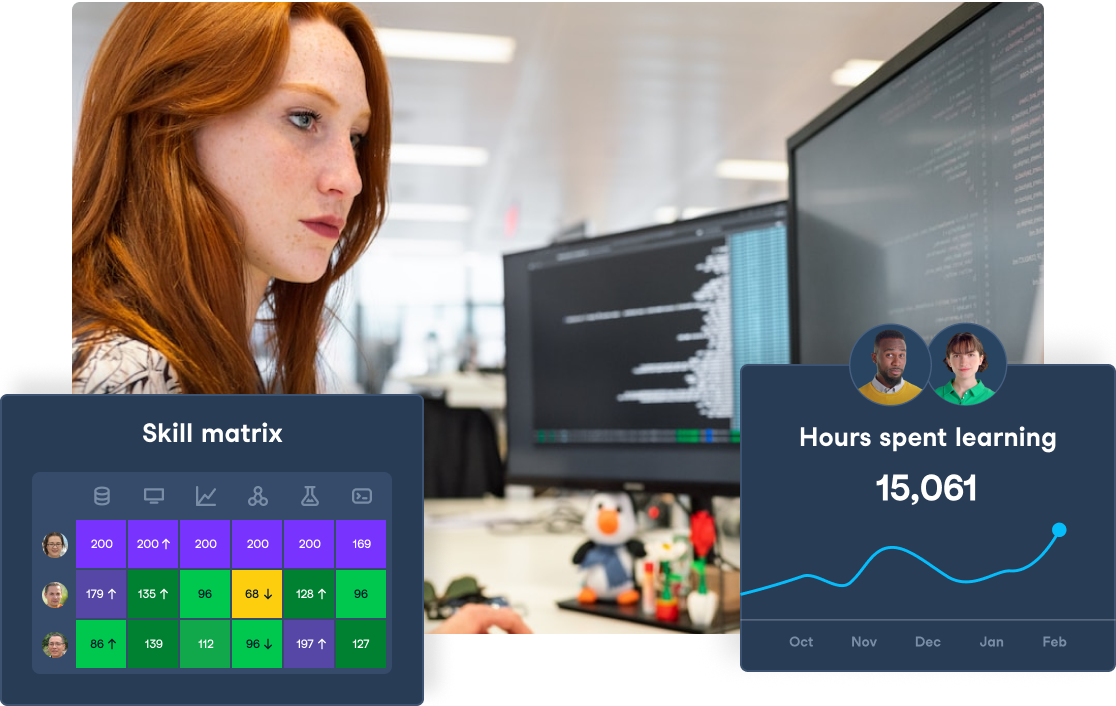
Why Use AI?
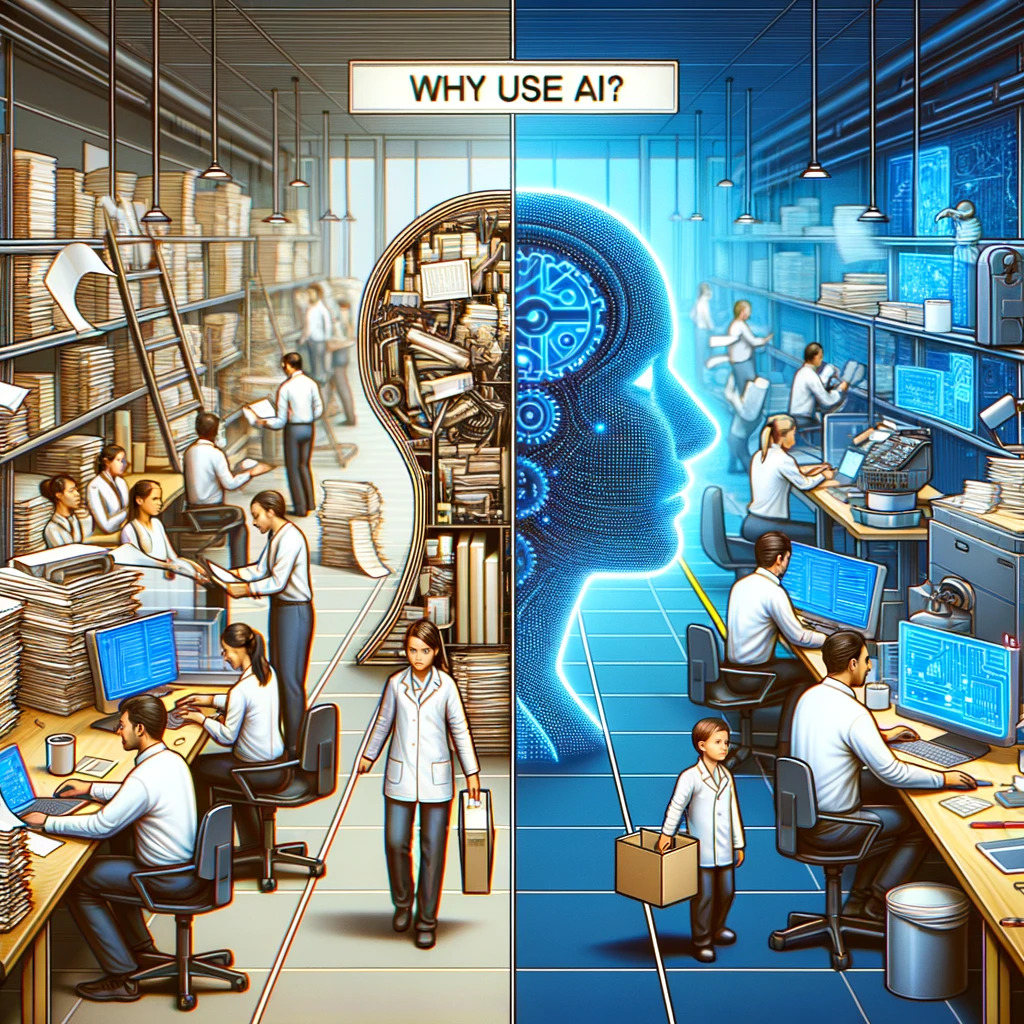
For aspiring and seasoned data practitioners alike, understanding AI isn’t simply beneficial—it's essential for staying relevant, effective, and competitive as the field of data science rapidly evolves.
Whether it's healthcare, finance, or retail, AI's ability to quickly and accurately handle vast amounts of data makes it an invaluable tool. Likewise, AI has allowed many organizations to effectively future-proof their IT infrastructures, using everything from AI-powered predictive analysis for cybersecurity to automating updated reports and data gathering.
This technology is expected to contribute as much as $15.7 trillion to the global economy by 2030, a glimpse of the transformative impact on various industries that AI solutions are already having in our world.
By automating routine tasks, minimizing human errors, and optimizing resource allocation, AI significantly reduces costs. Companies that leverage AI effectively often gain a competitive edge, as they can offer more innovative, cost-effective solutions and respond more quickly to market changes.
Why learn AI with DataCamp?
To help you get started, DataCamp offers an accessible and powerful platform that allows both new learners and seasoned veterans to learn AI from scratch. With its focus on practical, hands-on learning, DataCamp bridges the gap between theoretical knowledge and real-world application.
- Comprehensive curriculum: DataCamp provides a wide range of courses that cover various aspects of AI, from basic principles to advanced applications.
- Industry-relevant skills: The platform ensures that learners acquire highly sought-after skills in the industry, making them job-ready.
- Interactive learning experience: DataCamp’s interactive courses make learning engaging and effective, with immediate feedback and real-life examples.
- Flexibility and accessibility: With easy online access, learners can progress at their own pace and convenience, fitting learning into their existing schedules.
- Community and support: DataCamp offers a supportive community and resources, aiding learners in becoming proficient in AI.
Examples of AI in E-Commerce
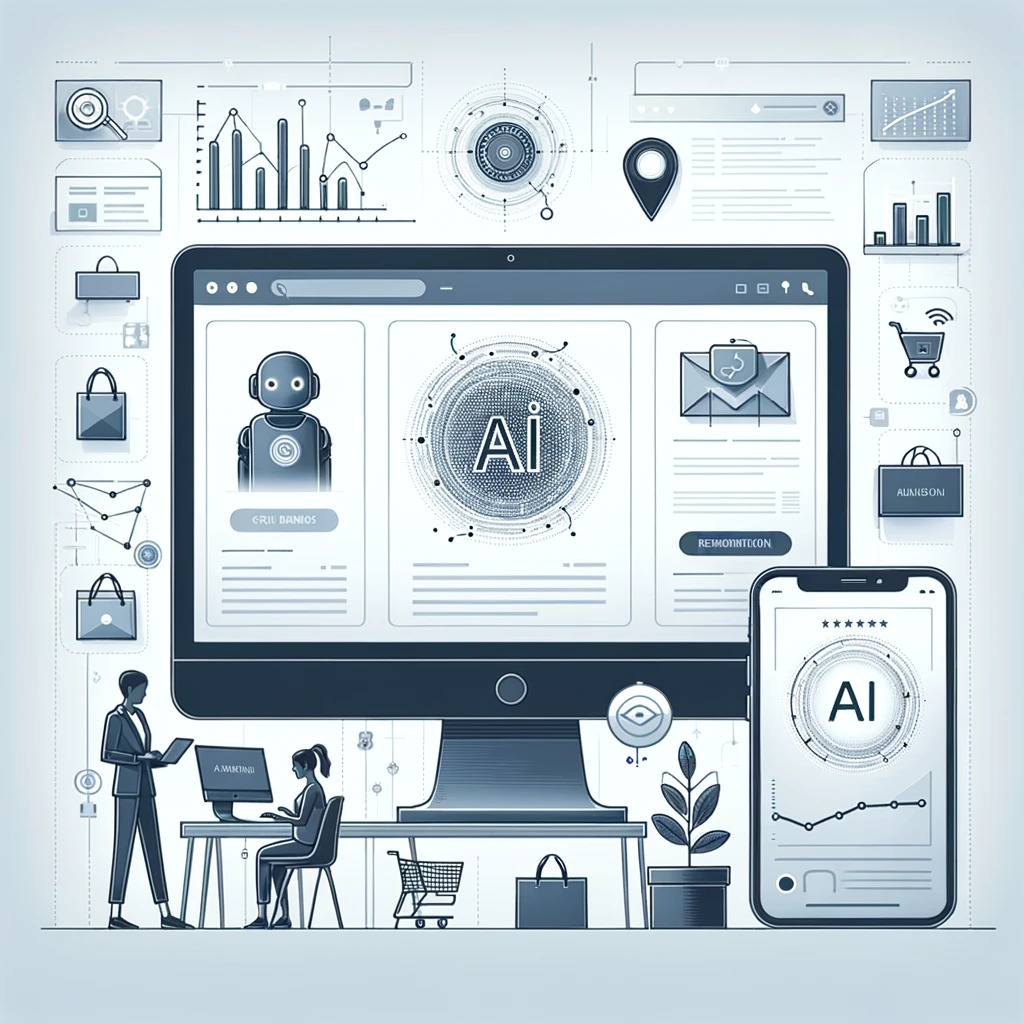
The integration of AI solutions in the e-commerce sector has found many use cases that are already being implemented industry-wide. The rate of growth is quite rapid, with global spending on AI in e-commerce set to reach $16.8 billion by 2030.
In this area, the application of artificial intelligence touches on personalized marketing, automated customer service solutions, the accessibility of doing business, and security. We have a separate article covering generative AI in e-Commerce, which goes into more detail.
1. Personalized shopping experiences
AI is a pivotal component in transforming shopping experiences into personalized journeys for each customer. The use of advanced algorithms and ML solutions can curate highly personalized product recommendations by analyzing a user’s browsing history, purchase patterns, and even social media activity.
Our course on Market basket analysis in R covers some of the techniques used to personalize and visualize recommendation systems.
2. AI-powered assistants
Although we haven’t yet reached the point where AI and automation can completely take over when it comes to customer service (as anyone who has used an average chatbot can tell you), the increasing adoption of automated virtual assistants is becoming more and more prevalent.
Although the primary use-case as of right now is savings and efficiency for a business by using automated responses, this application holds much promise. These chatbots serve as the first point of contact for customer inquiries and provide instant responses to common questions about products, services, and policies. You can explore how to build chatbots in Python with our online course.
3. Rapid website building
AI can leverage data analysis and its ability to generate content to help small businesses like e-commerce shop owners build their websites from the ground up. Even using the cheapest website builders will allow entrepreneurs to design whole websites and ensure cohesive branding, all without knowing how to code.
While setting up a website hasn’t been incredibly demanding in terms of tech know-how for some time now, AI’s true potential in this regard lies in the possibility of adopting scalable, system-wide best practices without even a shred of technical knowledge—something that isn’t yet the case.
4. Fraud prevention
Artificial intelligence is already being used to significantly enhance the security of e-commerce platforms by identifying and preventing fraudulent activities. AI systems can detect anomalies that might indicate fraudulent transactions by analyzing purchasing patterns, user behaviors, and transaction data.
The two main advantages of this technology in this regard are the ability to react in real-time and pick up on subtle discrepancies in factors such as transaction times that human scrutiny so often fails to detect.
There are various fraud detection techniques, such as random forest classifiers and k-means clustering, which are used in anomaly detection. Check out our Fraud Detection in Python course to learn more.
Examples of AI in Education
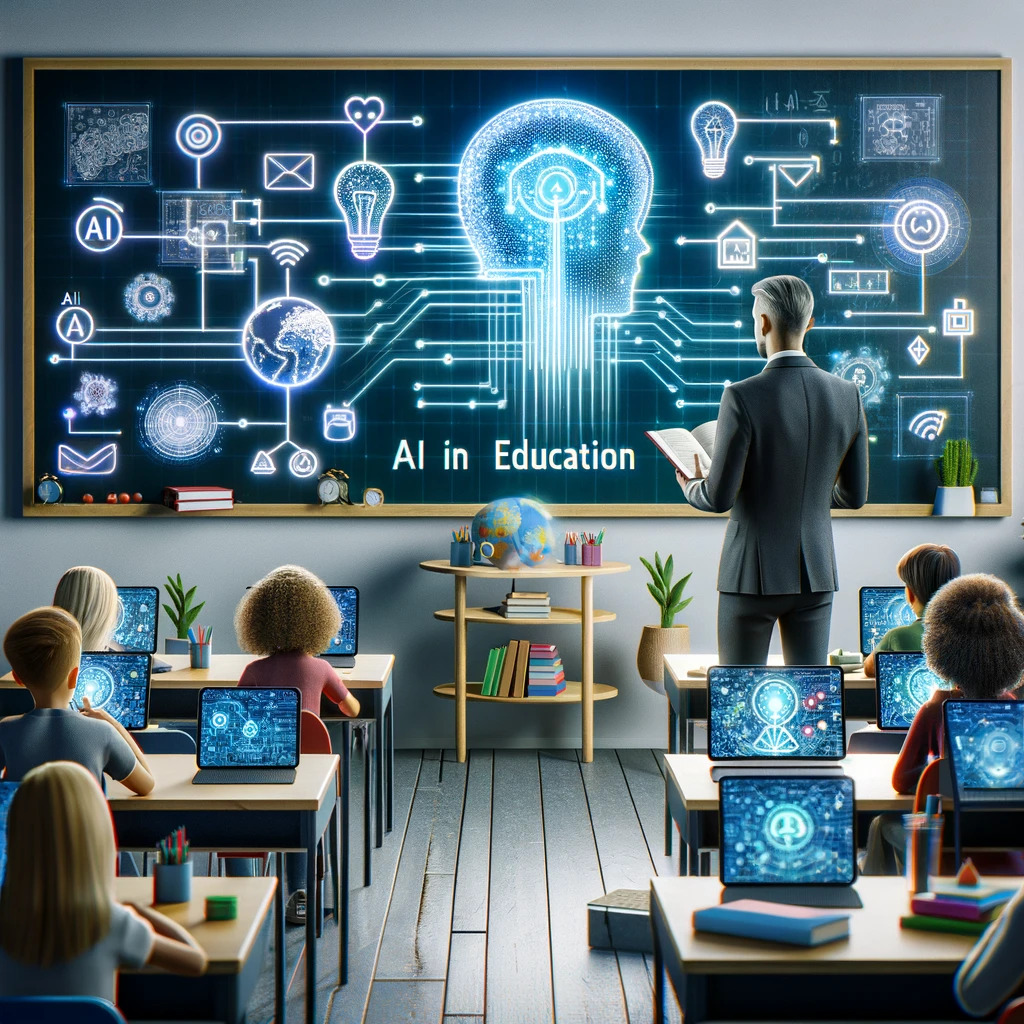
The increasing integration of AI in education is reshaping the learning and teaching experience. AI's applications in this domain range from reducing administrative burdens to creating dynamic educational content and tailoring personalized learning experiences.
In addition to that, the analytic application of AI could determine what factors led to student engagement, giving both teachers and policymakers the ability to put in place data-driven solutions in one of society’s most critical areas.
5. Administrative automation
Potentially one of AI's most significant contributions to education is the automation of administrative tasks. AI systems can handle routine tasks such as grading, tracking attendance, and responding to common student inquiries.
Driving down costs is a benefit in terms of educational accessibility while reducing the non-essential workload of teachers (who already work an average of 53 hours per week per the Rand corporation) will reduce burnout rates in the profession, allowing educators to focus on the core priorities of their profession.
6. Smart content creation
Generative artificial intelligence is revolutionizing the way educational content can be developed and delivered. 'Smart content' refers to digital learning materials that are interactive, customizable, and adaptable to individual learning styles.
Learning materials that are carefully tailored to the curriculum, ranging from elementary education to university-level courses, along with customized textbooks, study guides, and digital interfaces that are interactive and engaging, are just some of the potential applications of generative AI when it comes to educational content.
7. Personalized learning
Perhaps one of the most impactful applications of AI in education is the ability to provide personalized—not just interactive, learning experiences in the classroom.
Based on students’ learning data, these systems can customize the learning experience to suit each student’s needs, adjusting the pace of learning, the complexity of tasks, and even the teaching style. Check out DataCamp’s own DataLab AI assistant and take the next step on the road to developing and monetizing your knowledge in AI, data science and more.
AI Examples in Business Management
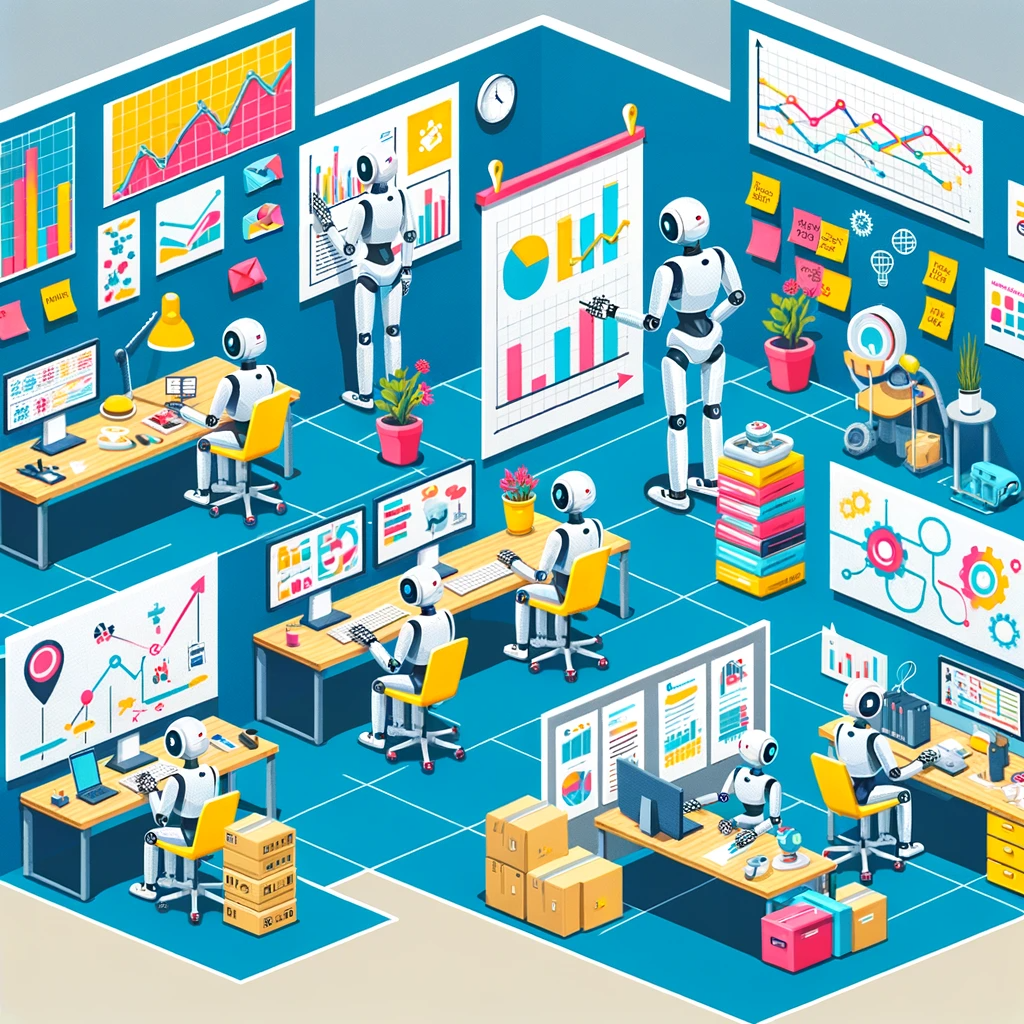
The three main applications of tech advances in business management are automation, allowing for more data-driven decision-making, and advances in customer relations.
While the exact ways artificial intelligence will change a business will depend chiefly on industry, business management, regardless of industry, will continue to leverage these tools for increased productivity, optimization, and prediction.
8. Automation of admin tasks
AI has made significant strides in automating administrative tasks that are often time-consuming and repetitive. Through AI-driven software and applications, businesses can streamline paperwork processes, manage scheduling efficiently, and handle routine office operations with greater ease.
We don’t even have to limit ourselves to your typical, large business that functions out of an office; for example—tools like roofing software, with features such as predictive pricing, AI-enhanced offer comparisons, and automated alerts when stock is going low, allow contractors to effectively rely on AI for management and perhaps the majority of the administrative part of the job.
9. Enhanced decision-making
In processing vast amounts of data, AI can easily identify trends, forecast outcomes, and provide data-driven recommendations for business strategies, which are particularly valuable in market analysis, financial planning, and operational efficiency.
When it comes to strategic planning and decision-making, AI offers powerful tools for business analysis and insights. Leveraging predictive analytics and advanced modeling makes advanced risk assessment possible, particularly crucial in industries where market conditions are volatile and rapidly changing.
10. Customer relationship management
AI has significantly enhanced the capabilities of customer relationship management or CRM systems, and businesses can offer more personalized and effective customer service by leveraging AI.
AI-powered CRM tools can rapidly analyze customer data, including past interactions, preferences, and buying behavior, to tailor communications and recommendations. This personalization leads to improved customer satisfaction and loyalty.
AI in Daily Life

Since we can’t cover every way in which AI is being integrated into our personal lives, we’ll hone in on the three most felt use cases—smart homes, autonomous vehicles, and entertainment.
11. Smart homes and IoT
AI is a cornerstone in the evolution of smart home technology and the Internet of Things, also known as IoT.
Examples of AI in smart homes and IoT include AI-powered devices like thermostats, home security cameras, and voice assistants that learn from our habits and preferences to automate tasks, enhance security, and improve energy efficiency.
12. Autonomous vehicles
Autonomous vehicles represent one of the most exciting applications of AI, and these self-driving cars and drones use AI to interpret sensor data, make decisions, and navigate safely.
AI algorithms process vast amounts of data from cameras, radar, and lidar systems to understand the vehicle's surroundings, predict the actions of other road users, and help it make split-second decisions.
13. Entertainment and media
When it comes to entertainment and media, AI plays a pivotal role in shaping our viewing and listening experiences.
Streaming services like Netflix and Spotify use AI-driven recommendation systems to analyze our viewing and listening habits, considering factors like previously watched shows, search content, and even the time spent on particular titles to suggest movies, TV shows, and music that are carefully tailored to our exact preferences.
AI in Navigation and Logistics
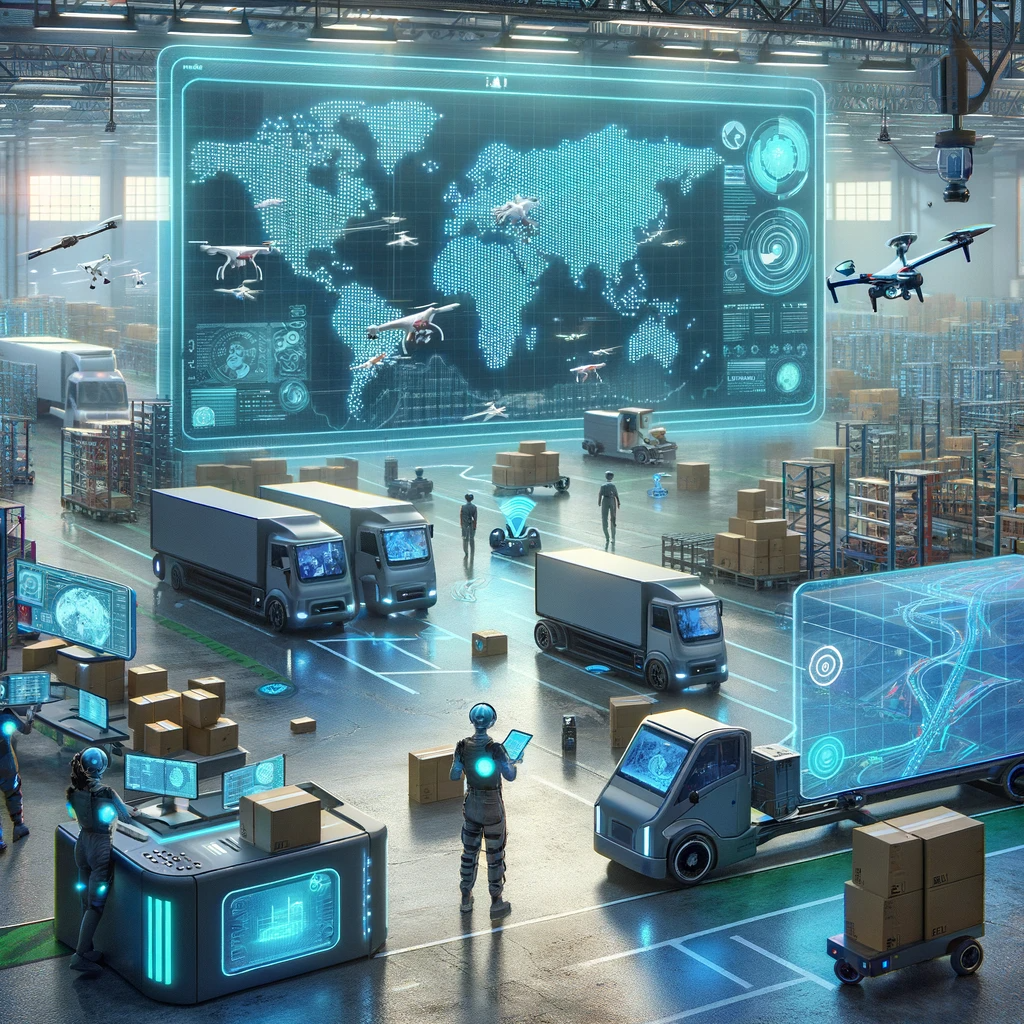
A prime target for AI’s capabilities in managing and optimizing complex systems, this technology’s application in navigation and logistics is currently focused on ensuring sustainable and cost-effective operations.
14. GPS and route optimization
AI algorithms analyze vast amounts of data, including current traffic conditions, historical traffic patterns, road closures, and weather reports, to determine the most efficient routes, which is particularly beneficial for logistics and delivery services.
By considering multiple destinations and the specific requirements of different loads, AI can optimize delivery routes, leading to significant reductions in fuel consumption and delivery times.
15. Traffic management
AI's impact extends beyond individual route optimization to encompass broader traffic management systems. In urban areas, where congestion is a common challenge, AI systems analyze traffic in real-time, using data from a network of cameras, sensors, and GPS devices.
These systems can quickly identify patterns and predict congestion, enabling traffic control centers to take proactive measures such as adjusting traffic signal timings, rerouting traffic, and providing real-time information to drivers.
AI Examples in Healthcare
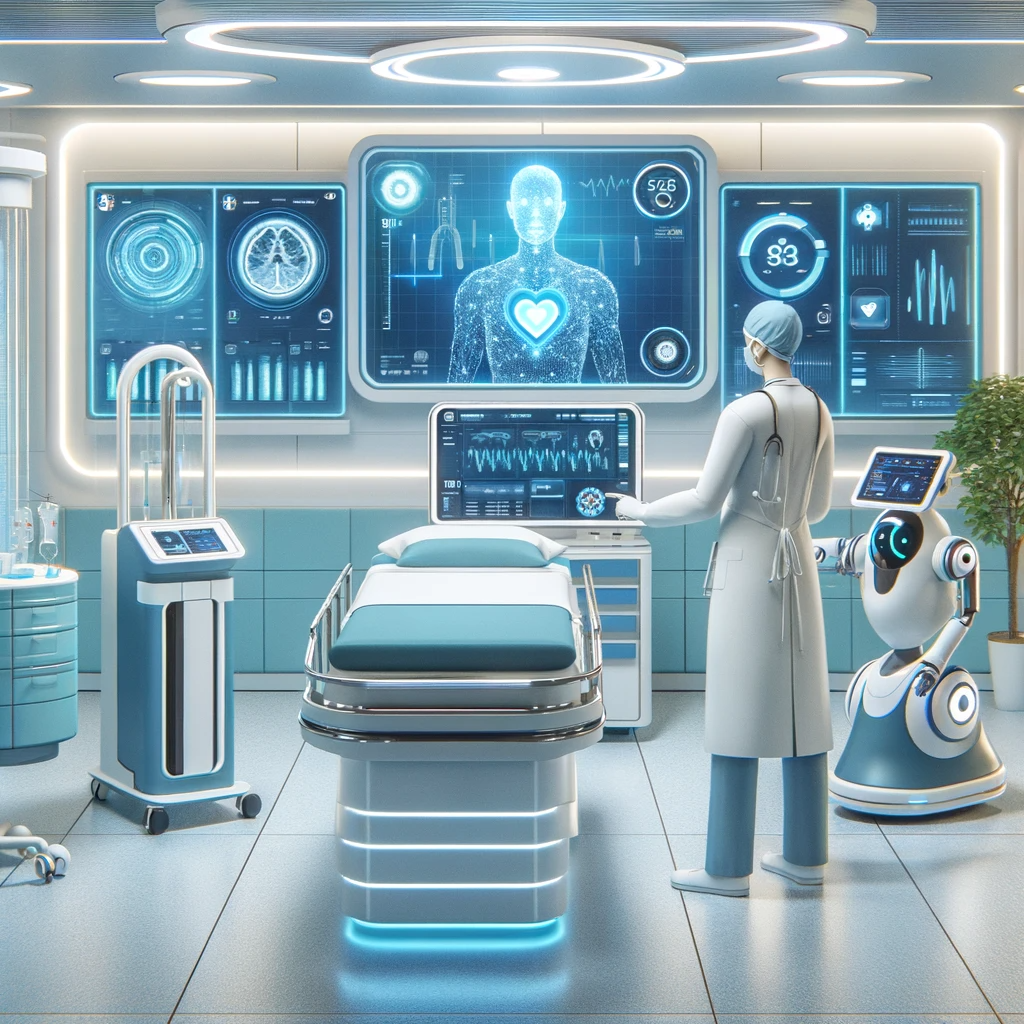
The impact of AI in healthcare is profound and multifaceted, offering groundbreaking advancements in diagnosis, drug discovery, and development.
With the technology already having achieved remarkable accuracy in diagnosis, it’s no wonder that, as one of the most promising applications of artificial intelligence, the global AI healthcare market is projected to be worth nearly $188 billion by 2030, with a compound annual growth rate of 37% from 2022 to 2030.
16. Disease detection and diagnosis
By leveraging sophisticated algorithms and deep learning techniques, AI can analyze medical images such as X-rays, MRIs, and CT scans with remarkable accuracy and speed. This capacity allows for the early detection of conditions and diseases, often before they manifest significant symptoms.
17. Drug discovery and development
When it comes to pharmaceuticals, AI and big data analytics are significantly accelerating the process of drug discovery and development.
AI can analyze vast databases of chemical compounds and simulate their interactions with biological targets, thus identifying potential candidates for new drugs much more rapidly. Advanced algorithms can also predict how different drugs will react in the human body, which helps understand potential side effects and efficacy early in development.
AI in Finance
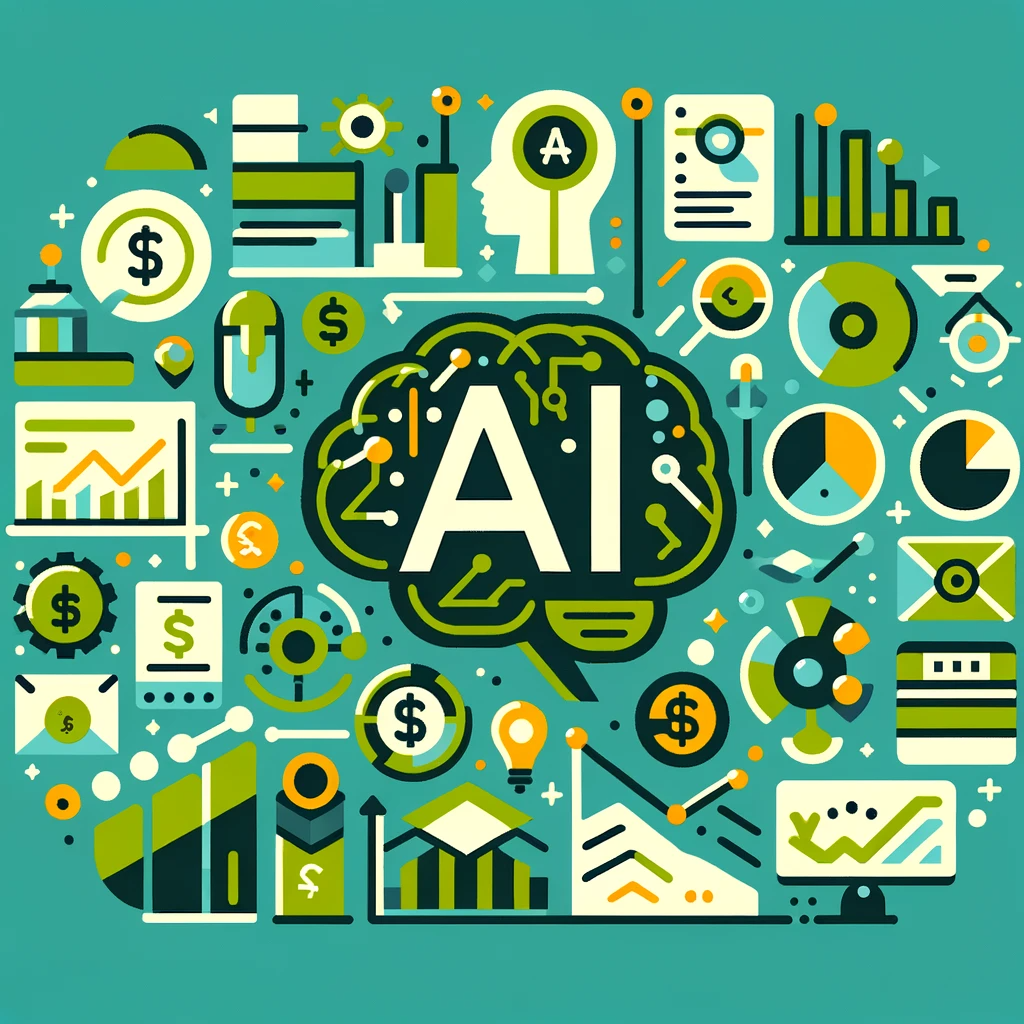
From outsmarting fraudsters with advanced fraud detection techniques to fine-tuning risk assessments for loan and credit decisions, AI is at the forefront of financial innovation, offering a glimpse into a future where every financial move is smarter, faster, and more attuned to individual needs.
18. Fraud detection
AI is pivotal in detecting and preventing financial fraud, a constant marring the finance industry. One of the key strengths of AI in fraud detection is its ability to process and analyze various data points, such as transaction location, amount, frequency, and merchant type, to build a comprehensive understanding of normal customer behavior—any deviation from this norm can be flagged for further investigation by humans.
19. Risk assessment
Big data analytics and AI significantly enhance the decision-making process in the context of loan approvals and credit assessments. Traditionally, loan approval processes relied heavily on credit scores and fixed criteria, which could often overlook the nuances of an individual’s financial situation.
AI algorithms, however, can analyze a broader range of factors, including income stability, spending patterns, and even social media activity, to gain a more comprehensive overview of an applicant's financial health.
And, of course, this is without even getting started about practical AI applications by individuals for everything from creating risk reversal strategies for options trading to analyzing stocks for buy/sell candidates. Both individuals and companies have once again capitalized on the capability of AI to sift through large quantities of data and provide tangible output that can be properly utilized.
AI Examples in Agriculture
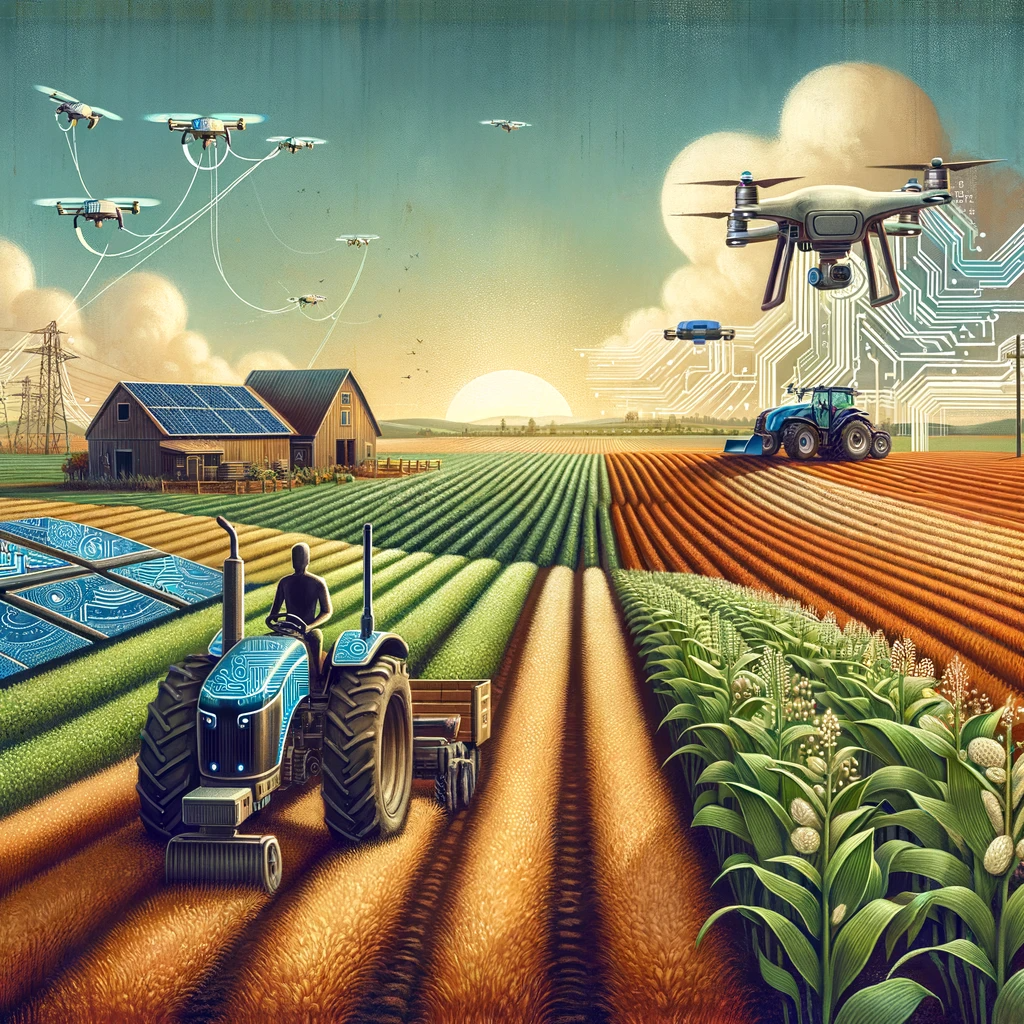
The adoption of AI in agriculture is a game-changer, marking a significant leap in how we cultivate our food and manage our natural resources to be more efficient and sustainable while being more attuned to the delicate balance of nature.
AI technologies are being employed in various aspects of agriculture, from crop and soil monitoring to the deployment of agricultural robotics, let’s look at some key AI examples to showcase
20. Crop and soil monitoring
Farmers can utilize AI-driven algorithms to analyze data from various sources, such as satellite images, sensors in the field, and even drones.
AI systems can find nutrient deficiencies, water stress, pest infestations, and detect diseases in crops at early stages, allowing for timely intervention, which is crucial in preventing crop losses. Furthermore, AI enables precise soil analysis, helping farmers understand soil moisture levels, pH balance, and nutrient content.
21. Agricultural robotics
The introduction of robotics in agriculture, powered by AI, is rapidly transforming farming operations. Agricultural robots are being used for various tasks, such as planting seeds, weeding, harvesting, and even fruit picking.
These robots are equipped with sensors and AI algorithms that allow them to navigate fields, identify crops, and perform tasks with high precision and efficiency.
Examples of AI in Marketing
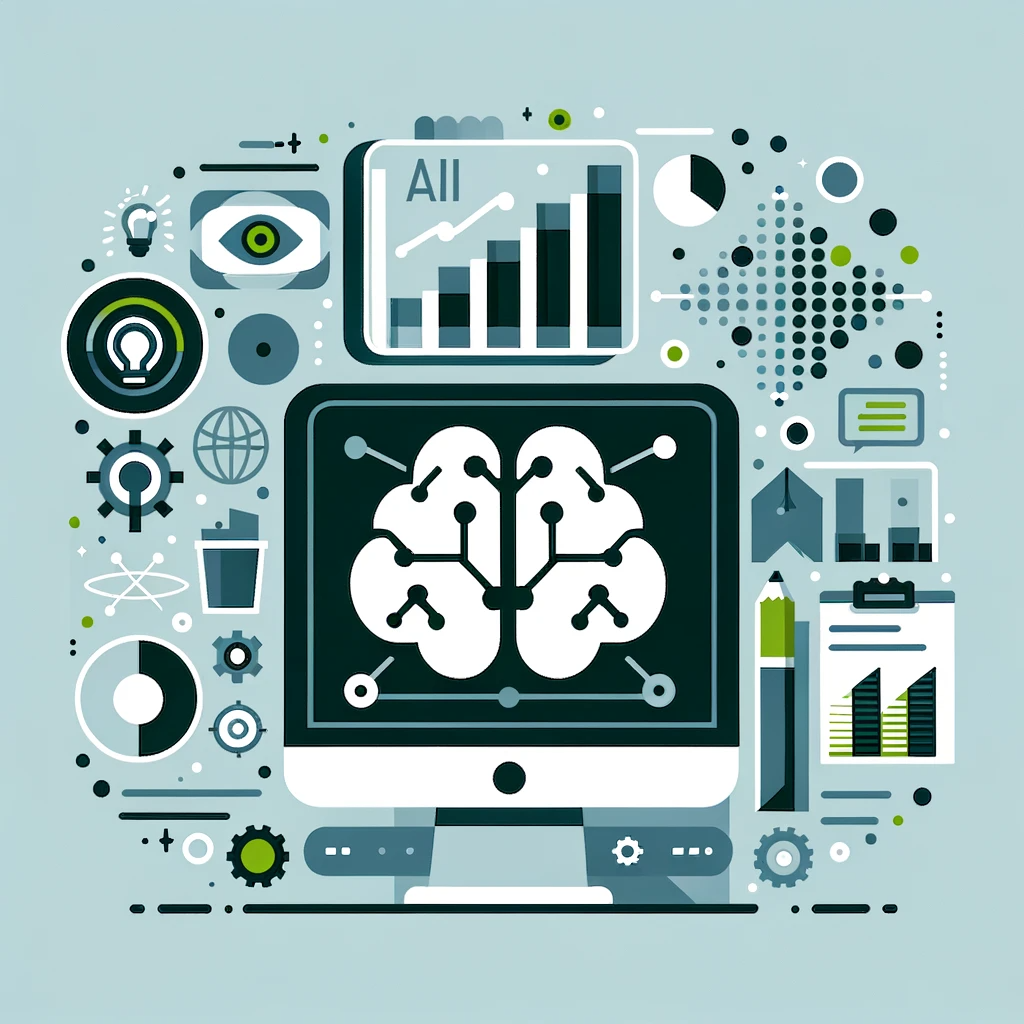
AI has become a crucial component in the marketing sector, offering innovative tools for understanding and engaging consumers more effectively. Integrating AI in marketing strategies enables businesses to analyze consumer behavior and personalize content at an unprecedented scale.
22. Consumer behavior analysis
AI technologies excel at gathering and analyzing vast amounts of consumer data, providing deep insights into consumer behavior and preferences.
Through AI algorithms, marketers can track and interpret patterns in customer interactions, purchases, and online activities, helping them understand the factors influencing consumer decisions, preferences, and trends.
23. Content personalization
Tools powered by artificial intelligence and machine learning enable marketers to deliver personalized content to consumers based on their unique preferences and behaviors.
In addition to analyzing the data, marketers can consolidate all that information in a single dashboard. This comprehensive view has only been possible with the advent of user-friendly UIs for large language models, or LLMs, and various LLM-derived tools that are now commonly used in marketing.
Based on their browsing history and purchase behavior, E-commerce websites also use AI to show users products they are more likely to be interested in based on their browsing history and purchase behavior. In email marketing, AI can optimize email content, subject lines, and send times for each recipient, increasing the chances of engagement.
AI in Data Security

AI's threat detection and network monitoring capabilities are pivotal in ensuring robust cybersecurity measures—particularly as any significant advancement in tech leads to its own security arms race.
24. Threat detection and prevention
Traditional security measures often rely on recognizing known malware signatures or specific threat patterns, which can be ineffective against new or evolving threats. AI significantly enhances the ability to detect and prevent cyber threats.
This is achieved by adopting a more proactive and dynamic approach—utilizing machine learning algorithms allows AI systems to analyze patterns and anomalies in data, identifying potential threats even if they haven't been encountered before.
These AI systems are trained on vast datasets of cybersecurity incidents, enabling them to learn and adapt to cyber attackers' new tactics, including detecting unusual access patterns, suspicious network traffic, or anomalies in user behavior that may indicate a security breach.
25. Network monitoring
Manual monitoring is impractical and prone to human error in an environment where data flows are immense and complex—but with its capacity to process and analyze large volumes of data on the fly, AI easily overcomes these limitations.
AI plays a crucial role in network monitoring, continuously analyzing data traffic to ensure the security and integrity of information systems.
The Need For AI Reskilling and Upskilling
As AI continues to reshape industries, the importance of staying ahead of this technological shift cannot be overstated. Professionals across all sectors are facing the need to reskill and upskill, ensuring they have the expertise to thrive in an AI-powered world. With AI automating routine tasks and revolutionizing decision-making processes, employees must develop advanced skills to remain competitive and contribute to their organization’s success.
For businesses looking to reskill in AI, DataCamp for Business offers a comprehensive solution. By providing tailored learning paths in AI, data science, and machine learning, teams can upskill efficiently while staying aligned with industry demands. Investing in AI education now ensures your workforce is prepared to lead in tomorrow’s data-driven economy.
You can request a demo today and learn how DataCamp for Business can provide a tailored learning experience to match the ambitions of your organization. With detailed reporting, scalable learning paths, and a vast catalog of resources, DataCamp for Business can help your business master the skills needed to embrace the age of AI.
Elevate Your Organization's AI Skills
Transform your business by empowering your teams with advanced AI skills through DataCamp for Business. Achieve better insights and efficiency.

Conclusion
The widespread integration of AI underscores a clear message for professionals across all sectors: adapting to and leveraging AI is essential if you’re to achieve growth and success.
Embracing AI is critical for staying ahead regardless of one's field—be it data science, healthcare, education, or business leadership. As AI continues to evolve, it promises to open up even more avenues for innovation and progress, and its potential is limited only by our collective imagination and creativity.
So, what are you waiting for? Check out DataCamp’s AI Fundamentals skill track, and you’ll gain access to six courses that will put you in a prime position to capitalize on the AI hype and eventually monetize it.
AI In Industries FAQs
How is AI expected to change the job market in the next decade?
According to research by McKinsey and Company, AI is projected to automate up to 30% of hours currently worked in the US economy, necessitating up to 12 million occupational transitions. This means many jobs will evolve or be replaced by AI, creating a need for new skills and roles that are yet to be defined.
What industries will be most affected by AI?
AI will likely eventually impact every industry, but the most significant changes are expected in healthcare, finance, retail, education, and business management. Each sector will see improvements in efficiency, accuracy, and the ability to handle large amounts of data.
How can businesses future-proof their operations with AI?
Businesses can future-proof their operations by integrating AI into their IT infrastructure, utilizing AI for predictive analysis, automating routine tasks, and optimizing resource allocation. This helps in reducing costs, minimizing errors, and responding quickly to market changes.
What are the main benefits of AI for small businesses?
AI can help small businesses by automating customer service through chatbots, personalizing marketing efforts, enhancing security against fraud, and even assisting in building and maintaining websites without requiring technical expertise.
Why is learning AI important for data practitioners?
For data practitioners, understanding AI is essential to stay relevant and competitive. AI provides powerful tools for analyzing data, creating predictive models, and automating tasks, which are crucial skills in the rapidly evolving field of data science.
Worked on large scale enterprise projects and built compliance teams at multiple Fortune 500 companies | Previously - Digital Compliance @ Netflix